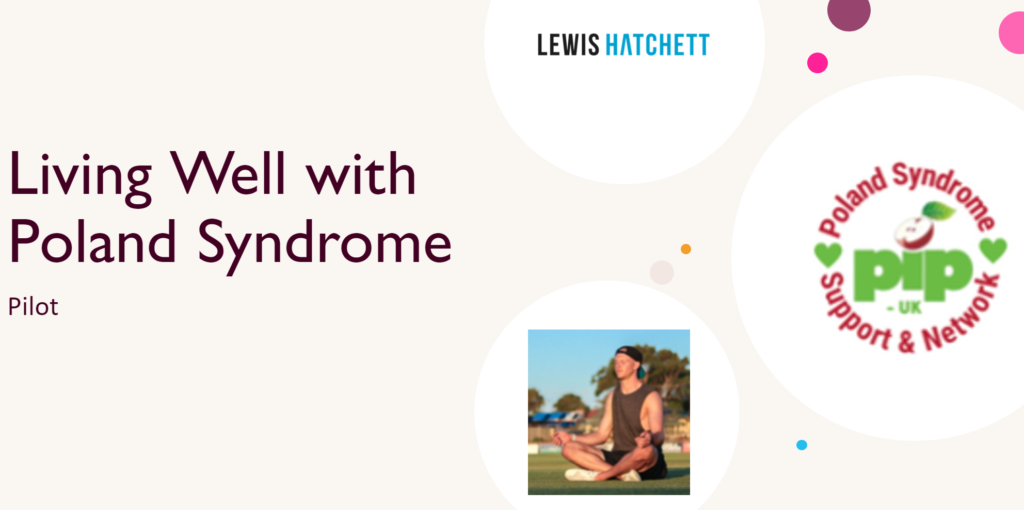How positive journaling can improve your outlook when living with Poland Syndrome.
Tiegan MacAulay
Poland syndrome is a condition whereby a person’s muscles on one side of the body are absent or undeveloped, causing anomalies in the chest, as well as the shoulder, arm, and hand. The extent and severity of the anomalies differ between those who are affected, with some cases displaying webbed fingers (Chowdhury et al., 2015)(Poland Syndrome: MedlinePlus Genetics, 2016).
Those with Poland Syndrome often face mental health issues as a result of challenges they experience when living with the condition. As the condition noticeably affects how one looks, those with the condition may also face issues with self-esteem whilst growing up. Issues with self-esteem can be especially hard to combat, and often the areas of the body that those with Poland Syndrome find most challenging to accept and find confidence in are areas that are undeveloped or absent due to their condition. Because of this, those born with Poland Syndrome may have to have cosmetic surgery before they can ever find confidence with how they look. Polina talks about this in her blog, describing how as a teenager, she faced a lot of ridicule as a result of her underdeveloped right breast, causing her a great deal of upset (mhamer, 2022). Beyond the specific mental health challenges associated with Poland Syndrome, simply living with a rare disease can be extremely detrimental to one’s mental health, frequently causing higher rates of anxiety, stress, low mood, and exhaustion, due to the unique challenges that people face when dealing with a rare disease, such as delayed diagnostic journeys and difficult-to-treat symptoms (Rare Disease UK, 2018).

PIP UK teamed up with one of its Ambassadors, Lewis Hatchett, to create ‘Living Well with Poland Syndrome,’ a free 6-week programme that focuses on the use of expressive writing and group work to promote the mental health of young people with Poland Syndrome aged 16 to 25. Lewis Hatchett, a 32-year-old former cricket player with Poland Syndrome, which manifests as a missing right pectoral muscle and two ribs, led the programme. Lewis progressed through the ranks of cricket, despite being instructed from birth that he should avoid contact sports, taking an amazing 102 wickets in 53 first-team outings across all leagues (ESPN, 2022). Lewis now hopes to show youth with Poland Syndrome that they, too, are capable of extraordinary feats, hoping to “reframe negative experiences”, and come to realise that the story these young people with Poland Syndrome have been telling themselves is coming from a negative inner voice by sharing their story in the MindStrong journal (PIP-UK Charity, 2021). Lewis hopes that by doing so, the positive inner voice would be able to emerge and shine through. The programme includes a variety of interesting exercises such as prompt and response sections, vision boards, and spider diagrams, all of which encourage meaningful expression. The first week focused on building confidence and community, the second week on understanding and building on your strengths, the third week on developing techniques to cope with mental health struggles, the fourth week on training techniques with Poland Syndrome, the fifth week on grounding techniques, and the sixth week on reinforcing all of the techniques learned throughout the programme. Overall, the goal of this programme was to provide these young people with Poland Syndrome with a toolkit of strategies and abilities to assist them learn to ‘live well’ with Poland Syndrome by following the structure provided. Journaling was used as an effective tool throughout this programme, as it provides a safe and private outlet for expressing these thoughts and feelings- and has been found in studies to help reduce symptoms linked with traumatic, emotional, or stressful experiences, such as receiving a rare disease diagnosis and dealing with the obstacles that come with living with a rare disease. Writing about these experiences has been demonstrated to promote the psychological health of both clinical and non-clinical groups (Baikie & Wilhelm, 2005).
Those who participated in the programme took both an opening and closing survey which allowed improvements to be tracked over the course of the six weeks, with participants reporting an average 13 percent improvement in life satisfaction, 6 percent rise in happiness, 17 percent decrease in anxiety, and an astounding 24 percent increase in a sense of ‘worthwhile-ness’ for their day-to-day activities by the end of the programme. These findings clearly demonstrate that PIP UK’s MindStrong collaboration can dramatically improve the mental health of young participants—and the programme also had a major impact on youth self-esteem too!
The young participants reported a 17 percent decrease in their desire to have greater self-respect, indicating that their self-respect had improved since they began the programme!
Furthermore, participants’ inclination to have a positive attitude toward themselves increased by 23 percent, and their satisfaction with themselves increased by 9 percent. These findings demonstrate the powerful influence that journaling programmes can have on teenagers and young adults with rare diseases such as Poland Syndrome. Polina reported on her experience with the Living Well with Poland Syndrome programme within her blog, saying that “during this course I heard useful things, I even felt that my ideas were being heard,” and that she now doesn’t wear her prosthesis, feeling “better than ever before” (mhamer, 2022).
Overall, it appears that the Living Well with Poland Syndrome programme helped younger people with Poland syndrome change their perspectives on life and themselves. PIP UK would like to continue working in the future to promote the mental health of persons born with Poland Syndrome, based on the success of this programme.

I’m curious if there’s been any study done for adults that as a child was never given any consideration by parents to seek out solutions, other than SHAME and isolation while receiving physical abuse and no support from family, only ridicule and shame in an empty existence within a family dynamic.
Hi Kevin, I am sorry this comment was not picked up sooner, we don’t have a webmaster at present. I am also really sorry to hear your experiences with family. I am not aware of any studies around this, there is very little research in Poland Syndrome in general unfortunately. I want to share some resources for some extra support https://pip-uk.org/poland-syndrome-mental-health-resources. I wanted to make sure you are connected with our community too, Here are the best ways to connect:
1) Sign up to hear all the latest news and events from our community here: https://forms.gle/z6BqezxqqE3JWNGM8
2) Join our private facebook group, a safe space to share experiences and ask questions of other families here: https://www.facebook.com/groups/pipukpolandsyndromesupport
3) Sign up for our Poland Syndrome Community register, launched in 2022 we are working on improving the treatment and diagnosis of Poland Syndrome and collecting as much information as we can to help this goal. https://pip-uk.org/poland-syndrome-community-register
.